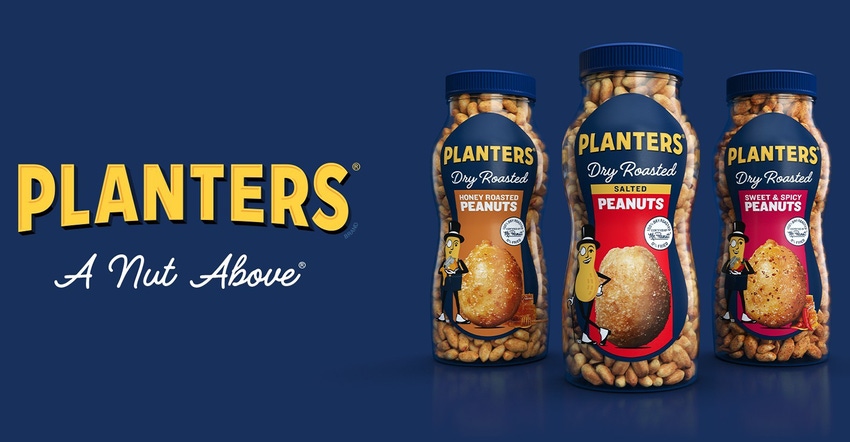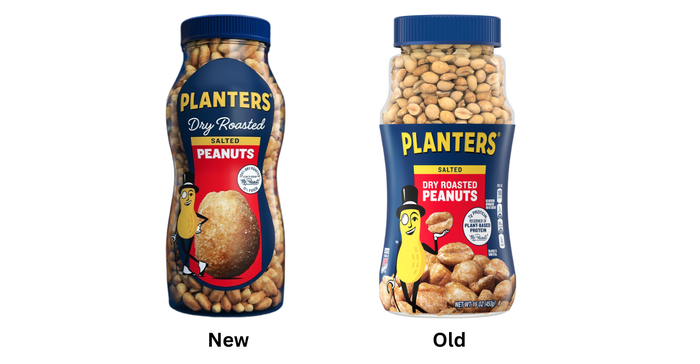Planters Nuts Packaging: More Peanut-Like, Less Plastic
Redesigned peanut-shaped bottles save up to 220 tons of PET plastic yearly as Hormel Foods continues to improve packaging sustainability.
September 22, 2022

As savvy brands know, shape is a potent packaging design option that can trigger an emotional response from consumers.
One way to further leverage the visual impact and engagement is to have the packaging’s shape associated with the product.
That’s why the redesigned packaging for America’s #1 selling peanut brand, Planters Dry Roasted Peanuts, works effectively on several levels — and with a sustainable improvement.
While curvier and more peanut-like looking than before, the new 16-ounce PET containers also reduce the amount of plastic required. The bottles use 8% less polymer than the prior bottle, saving up to 220 tons of PET plastic yearly.
“Our new packaging allows us to truly stand out with a unique ‘shell’ that is just as premium and satisfying as the delicious [nuts] within,” says Allie Abney, associate brand manager. “Now snack lovers can enjoy their favorite peanuts in an even better, crave-worthy bottle that puts flavor in the spotlight.”
The redesign makes the bottle’s two rounded sections more pronounced than before when the bottle’s upper section was flat.

“The peanut-shaped hourglass bottle more closely resembles a legume than the original 16-ounce bottle,” Abney points out.
Along with the bottle’s physical change, the brand redesigned the label graphics.
“The new labels spotlight one supersized peanut rather than a pile of peanuts, so snack-nut fans can easily see the detail and appetite appeal of each respective flavor,” Abney tells us. “Mr. Peanut is still front and center, and we’ve reduced the label surface area so shoppers can get a better glimpse of what’s inside the clear bottle. New typography emphasizes the dry roasted preparation of the product.”
Maintaining the same amount of peanuts in the redesigned bottle was a key challenge, according to Abney.
Kudos to Hormel for maintaining the net weight status quo in this era of rampant shrinkflation.
The peanutier bottle is rolling nationwide for three product varieties, salted, honey roasted, and sweet & spicy.
Hormel’s other sustainable moves.
Like the diminutive peanut, small changes like reduced plastic can help make a big impact.
This packaging update is part of ongoing efforts by the brand’s parent company Hormel Foods in which the packaging team’s sustainability initiatives reduced product packaging by more than 727,000 pounds in 2021.
According to Hormel, that resulted from initiating 25 projects and completing 13 projects last year.
Hormel reports that more than 80% of packaging by weight is recyclable, with more than 30% made from recycled materials.
Some examples:
Justin’s PET jars are using 30% less plastic in 2022. The new jars, which were redesigned, tested, and approved in 2021, will save more than 165,000 pounds of material annually.
Hormel fully cooked entrees packaging was redesigned to include 25% of material from post-consumer recycling (PCR), which saves more than 382,000 pounds of virgin material each year.
Club Part Trays reduced the height of the PET plastic trays and eliminated the shrink sleeve from the tray locking design. This saved more than 23,000 pounds of plastic annually for a club party tray product.
Improving the palletization pattern of Columbus turkey bacon reduced the number of pallets and trucks needed to ship the product, saving more than 114,000 pounds of material annually.
Last, but not least, Hormel also added How2Recycle labels to more than 250 items in 2021.
You May Also Like


